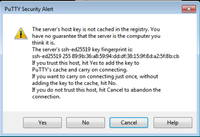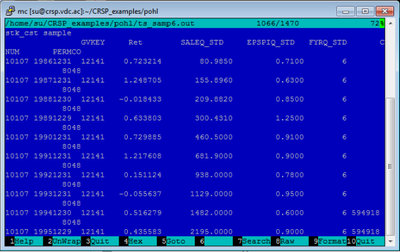CRSP
(→access) |
(→access) |
||
| Line 1: | Line 1: | ||
==CRSP, COMPUSTAT, CCM == | ==CRSP, COMPUSTAT, CCM == | ||
=== access === | === access === | ||
| − | + | ==== require credentials ==== | |
| − | + | email the VDC sysadmin to provide credentials and prepare your remote terminal | |
| − | + | <ul> | |
<li> | <li> | ||
host: crsp.vdc.univie.ac.at | host: crsp.vdc.univie.ac.at | ||
| Line 14: | Line 14: | ||
</li> | </li> | ||
</ul> | </ul> | ||
| − | + | ||
| − | + | ==== VPN ==== | |
| − | + | If working from home or not in the institute's PS lab (room #6.644) you have to establish a Virtual Private Network (VPN) to Uni ([https://zid.univie.ac.at/en/vpn/ see ZID/VPN]). | |
| − | + | ==== SSH ==== | |
| − | + | If working from Windows, you might need to install an SSH-client ([https://www.putty.org/ like PUTTY]) to use Secure Shell (SSH) to connect to your terminal. Accept the server key. | |
| − | + | [[File:3_accept_key.png|left|frameless|200px|caption]] | |
| − | + | ==== use terminal ==== | |
| − | + | [[File:4_terminal_session.png|left|frameless|400px|caption]] Now you work remotely and use the remote host's command line (which is the bash shell, don't type the beginning "$", which is the prompt): | |
| − | + | the midnight-commander (mc) provides an built-in editor mcedit (exit it with Alt+0) | |
| − | + | <pre>$ mc </pre> | |
| − | + | <pre>$ mcedit ts_samp7.rqt </pre> | |
| − | + | e.g. use "ts_print" to process a requirementfile "ts_samp7.rqt" and get the output "ts_samp7.out": | |
| − | + | ||
| − | + | ||
| − | + | ||
<pre>$ ts_print ts_samp7.rqt</pre> | <pre>$ ts_print ts_samp7.rqt</pre> | ||
| − | look into ts_samp7.out with: | + | [File:7_ts_print.png|left|frameless|400px|caption]] |
| − | <pre>$ | + | |
| − | + | ]use mc/mcedit to look into ts_samp7.out with: | |
| − | + | <pre>$ mcedit ts_samp7.out </pre> | |
| − | + | [[File:8_ts_samp6_out.png||frameless|400px|caption] | |
| − | + | use e.g. this command to get the switches for the command crsp_print: | |
| − | + | <pre>$ crsp_print /d1 /var/crsp/2019-07/crspdata/cmz201807</pre> | |
| − | + | use an SFTP client like [https://cyberduck.io/download/ CyberDuck] to download the results of your terminal session onto your desktop for further processing | |
| − | + | [File:10_cyberduck_credentials.png||frameless|400px|caption]] | |
| − | + | === documentation=== | |
| − | + | Please read some manuals to gain experience with the ts_sampleX.rqt files in your home directory | |
| − | + | [http://www.crsp.com/products/documentation/cupl-386-guide CRSP Utilities and Program Libraries (CUPL)] | |
| − | + | and maybe the [https://w3.loibl.com/uni/xf_understanding_the_data.pdf xf-understanding_the_data guide]. | |
| − | + | ||
| − | + | ||
| − | + | ||
| − | + | ||
Revision as of 14:38, 22 October 2019
Contents |
1 CRSP, COMPUSTAT, CCM
1.1 access
1.1.1 require credentials
email the VDC sysadmin to provide credentials and prepare your remote terminal
- host: crsp.vdc.univie.ac.at
- user: your username
- password: your password
1.1.2 VPN
If working from home or not in the institute's PS lab (room #6.644) you have to establish a Virtual Private Network (VPN) to Uni (see ZID/VPN).
1.1.3 SSH
If working from Windows, you might need to install an SSH-client (like PUTTY) to use Secure Shell (SSH) to connect to your terminal. Accept the server key.
1.1.4 use terminal
Now you work remotely and use the remote host's command line (which is the bash shell, don't type the beginning "$", which is the prompt):the midnight-commander (mc) provides an built-in editor mcedit (exit it with Alt+0)
$ mc
$ mcedit ts_samp7.rqt
e.g. use "ts_print" to process a requirementfile "ts_samp7.rqt" and get the output "ts_samp7.out":
$ ts_print ts_samp7.rqt
[File:7_ts_print.png|left|frameless|400px|caption]]
]use mc/mcedit to look into ts_samp7.out with:
$ mcedit ts_samp7.out
1.2 documentation
Please read some manuals to gain experience with the ts_sampleX.rqt files in your home directory CRSP Utilities and Program Libraries (CUPL) and maybe the xf-understanding_the_data guide.


